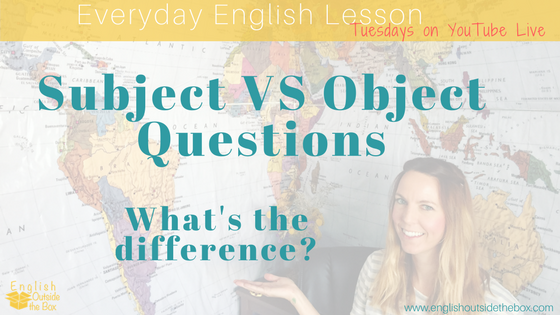
Object VS Subject Questions in English
If you’ve been following English Outside the Box the past couple of weeks, you have been reviewing a lot of information about questions. We’ve talked about the basic structure of questions, embedded and indirect questions, and maybe you have wondered about the difference between object and subject questions in English.
So, to close “question month”, let’s compare the difference between:
- Who did you call?
- Who called you?
I know that many students get confused because of the missing auxiliary in “who called you?”. The question word is another differing point that I want to help you understand today. So below is the replay and full lesson notes from today’s Everyday English lesson on YouTube.
In this lesson, you’re going to learn:
- the difference between subject and object questions in English
- important rules about the structure of each type of question
- how to ask and answer your own questions
Let’s do it!
Object and Subject Questions in English:
What is a question?
Questions are what we ask to get more information.
Sometimes we ask question that will give us the subject of the sentence, meaning that the answer and the information that we need will be the subject. Other times we ask questions that will give us the object of the sentence and, in this case, the answer will be the object.
*Remember: The subject is the person or the thing doing an action and it comes in the beginning of the sentence. The object of the sentence, which comes in the end or after a verb, is the person or thing receiving the action.
Most commonly you are going to use questions that ask about the object. You are getting extra information. You know the subject, you know the action and you want the extra details → you want the object.
What is the difference?
Object Questions
Remember the questions from the beginning of the lesson?
“Who did you call?” is an object question.
STRUCTURE:
[Question word + auxiliary verb + subject + main verb]
- question word – who
- auxiliary verb – did
- subject – you
- main verb – call
Answer: I called Paulo
Paulo is the answer, and that is the object of that sentence.
Object questions can use the following question words:
- Who
- What
- Where
- Why
- How
- When
*Notice: The main verb is always in its base form.
Here are some additional examples of an object question:
- Where did you go?
- Answer: I went to the store.
- When did she leave?
- Answer: She left last night.
- How are you feeling?
- Answer: I am feeling really good.
- What did they do last night?
- Why are you learning English?
- When did you sign up here?
- Who did you meet before the lesson?
- Where did you come from?
Subject Questions
Sometimes we don’t know the subject, we don’t know who did the action, what did the action, or what the main idea is. When we need this information, we ask a subject question.
In the beginning of this lesson I gave the example:
Who called you?
STRUCTURE:
[Question Word + verb + object]
- question word – who
- verb – called
- object – you
Answer: Paulo called me.
Paulo is the answer, and that is the subject of the sentence.
It is very important to remember that subject questions only use the question words Who and What.
*Notice: Because we don’t have an auxiliary, the verb needs to change and be conjugated to match the time tense.
Here are some additional examples of a subject question:
- Who is the one doing this live lesson? [Who is doing this live lesson?]
- Answer: I am the one doing this live lesson.
- What happened last night?
- Answer: It rained. A storm passed through.
- What helps you learn English?
- Answer: These videos help me learn.
- Who helps you learn English?
- Answer: Jennifer helps me learn English.
- What is the best English podcast ever?
- Answer: English Across the Pond is the best podcast ever!
- Who likes the song “Somebody That I Used to Know”?
- What causes happiness?
- Who will share this lesson later?
- Who is the one that’s following you on twitter? [Who is following you on Twitter?]
- Who follows Jennifer everywhere?
- Who gave up on learning English?
EXTRA INFORMATION ABOUT SUBJECT & OBJECT QUESTIONS
Notice that in both subject and object questions we can have different time tenses.
For example:
- Simple present:
Who wants a drink? Answer: I want a drink
- Present perfect:
Who has visited California? Answer: Many people have visited California
- Simple past:
Who killed Voldemort? Answer: Somebody killed Voldemort.
- Future:
Who will share this lesson later? Answer: Everyone will share this lesson later!
…etc…
We can also use modals as the auxiliary.
Who can help me? Answer: Paulo can help me.
Practice Makes Perfect
Review the following sentences. Then, create a subject and an object question for each.
Example:
Answer: Jennifer called Paulo
Object question: Who did Jennifer call?
Subject question: Who called Paulo?
1. English Outside the Box helps students around the world.
2. Exercise does great things for your health.
3. Jessica broke my favorite vase.
ANSWERS: Highlight the text to reveal the answers
1. SUBJECT: Who helps students around the world? OBJECT: Who does English Outside the Box help?
2. SUBJECT: What does great things for your health? OBJECT: What does exercise do great things for?
3. SUBJECT: Who broke my favorite vase? OBJECT: What did Jessica break?
Feel free to write your own examples and questions in the comments below!
Until next time,
Happy Studying! ♥
Do you need more opportunities to use English and practice what you learn? Join my monthly training program for group conversation calls, a conversation partner, and weekly materials! Sign up and get more information here:
The Conversation Club will provide you with 6 group conversation calls to practice with a real teacher and a group message community to connect with other members.
You will also get weekly English lessons to help your vocabulary, listening, reading, pronunciation, and more!
Try the Club for 1 week, free! Join the 1-week free trial here.

Appreciate the post. Would it not be, “Whom did you call?” though?
Hey great question! It depends if we’re talking conversational/spoken English or “perfect” (traditionally standard) English. “Who did you call” is an accepted variation, as language changes over time; although WHOM is the perfect grammar answer. In conversational English, or everyday use, “Whom did you call” would seem rather formal.
You are really a great teacher, this article saved my life 🥹thx.
very good